- Home
- S. Hussain Zaidi
Eleventh Hour Page 9
Eleventh Hour Read online
Page 9
After 26/11, Mirza, who was in the IB at the time, had set up a team to go through every bit of news media coverage, be it TV, print or online. The team had gone through lakhs of pictures and videos taken around the targets sites during the attacks and one of the members, Norman D’Souza, noticed a pattern. The same man was partially visible in a lot of the visuals of the vicinity of the target sites.
Mirza, after being notified, had asked Norman to track this man further and in twenty-four hours, the team had tracked his movements from the Leopold Cafe to the Taj Mahal Hotel, the Oberoi-Trident, Chhatrapati Shivaji Terminus and Chabad House.
‘He’s making an effort to hide, sir,’ Norman told Mirza. ‘He either turns away from news cameras whenever they pan his way or raises one hand to his face or something. The best we have is this.’
Mirza picked up the printout that Norman handed him. It showed the man looking away from a television news camera. He must have not known about the still photographer right behind him and ended up facing him, Mirza thought.
The face was partially turned towards the still camera but the lighting was bad, as it was shot at night. Mirza spoke to a few of his trusted contacts in the Mumbai police and told them what he needed. It took seven days but one of his cops ultimately found a CCTV camera in Colaba that had captured the man walking past while on his way to Leopold. Mirza confirmed the direction he had come from. It was Badhwar Park, from where the ten terrorists had entered the city.
Using the still that Norman had given him and the footage of the camera, Mirza got his experts to put together a composite image. He then shared it with his contacts in the intelligence and surveillance community the world over and asked for any information on the mystery man. Within an hour, he started getting responses from foreign agencies who had similar pictures of him. Facial recognition technology identified him as the same man. Whether at a blast site in Tel Aviv or the scene of a gun battle in Beirut, he was always among the onlookers who were gathered at the site of any terrorist attack.
Mirza probed further but found little information. Deep cover agents in Asia and the Middle East had heard of a man who was so committed to the cause of the global Caliphate that he would leave no stone unturned while planning his missions. He was said to be the uncredited brain behind scores of terror strikes, a master of disguise, utterly ruthless and thoroughly dangerous. Other reports said that he had an elaborate cover set up, thanks to which he led a perfectly normal life even while conducting the orchestra of terror across the continent. His ability to manage two personalities at the same time was said to be chilling. In Islamic terminology and Quranic verses, such men are referred to as Munafiq – hypocrites who masquerade as believers but are actually hidden enemies.
Praying hard, Mirza logged in to his storage space through the backdoor and opened the file he was looking for. He spent a long time studying the pictures put together by various intelligence agencies.
He tore his eyes away from the screen just as Vikrant came bursting through the door. Walking swiftly up to Mirza’s desk, Vikrant laid down several pages next to each other for his mentor to look at.
Vikrant had spoken to Goyal and Jaiswal, who were now on their way back to Mumbai and after listening to a detailed report of their activities, had asked Jaiswal to email him all CDRs of Rishabh Chawla’s number. He had then gone through the entire data and identified five numbers that Chawla had dialled the most and sought their cellular locations during the period that they were in touch with Chawla. He had received the reports ten minutes ago.
‘Chawla was in constant touch with these five people,’ Vikrant told Mirza. ‘And they spent all the time they were in contact in Pune. They never moved out of Ganesh Peth, where Parkar lived. How much do you want to bet that these five men were holding Parkar and his mother hostage while Chawla was setting up the jailbreak in Bhopal?’
Vikrant glanced up from the CDR reports and saw the look on Mirza’s face.
‘Okay,’ he asked. ‘What?’
Wordlessly, Mirza turned his laptop around.
‘O… okay…’ Vikrant said, perplexed, looking at the photos in Mirza’s secret storage. ‘And…?’
‘Switch tabs,’ Mirza told him.
Vikrant hit Alt+ Tab and found himself staring at the picture of Rishabh Chawla sent by the hotel manager in Bhopal. He switched tabs at least ten times before he could believe that he was looking at the same man.
‘Fuck,’ he said, sinking into a chair. ‘Munafiq?’
At that instant the landline started ringing.
26
Sunday afternoon, Mumbai.
‘You really don’t know why the CM wants to see you?’ Mankame asked.
‘He didn’t say,’ Mirza growled.
Mankame had returned from Pune an hour ago and was entering the NIA office when he spotted Mirza and Vikrant walking out. Mirza signalled him to come with them, and Mankame followed.
They all got into an NIA car. ‘To the Mantralaya, and step on it,’ Mirza barked at Mankame.
While he and Vikrant were sitting stunned at their discovery, Mirza had received a call from the chief minister of Maharashtra, Yashwant Pradhan. He had simply asked Mirza to meet him immediately and to bring Vikrant with him.
Mirza had people in various agencies that he could have called and found out why the CM wanted to see him, but his mind was still racing with the implications of one of the most dangerous terrorists in Asia having come to India two months ago, and possibly still hiding somewhere in the country. So he just sat looking out of the window, thinking hard, while Vikrant brought Mankame up to speed.
‘What was that word again?’ Mankame asked.
‘Munafiq,’ Vikrant replied as they entered the Mantralaya compound. ‘It’s the Urdu word for two-faced. Someone who assumes an identity but is actually somebody else.’
Mankame had more questions, but they had reached the parking lot by then. Mirza asked Mankame to wait in the car and jumped out even before the car came to a stop. Vikrant hurried after him.
The CM’s personal secretary was waiting outside the building for them. Quickly, they got into the lift and made their way up to his office. Chief Minister Yashwant Pradhan was sitting at his desk, while State Home Minister Sudarshan Raskar stood at the window.
‘Tashreef rakhiye, Mirza sahab,’ Pradhan said, trying to flaunt his Urdu, as both Mirza and Vikrant saluted the two politicians. Raskar turned around but didn’t say anything. From past experience, Vikrant knew that this was a bad sign.
‘So,’ Pradhan began as he dismissed his secretary. ‘What I’m telling you doesn’t leave the room. This is very important, so feel free to ask questions wherever you need to. Okay?’
Both cops nodded. Pradhan looked at Raskar, who cleared his throat and started talking.
‘Yesterday afternoon, a cruise liner from Mumbai to Lakshadweep suddenly went incommunicado. When their control room failed to get them on the radio repeatedly, they alerted the Coast Guard, who sent a chopper to its last-known location.
‘The Coast Guard found the liner anchored off Lakshadweep under the control of armed men. Our first impression was that they’re Somali pirates, but the Coast Guard disagree, saying they look well-built, combat-trained and what not. Anyway, one of the pirates, for want of a better word, used a strong flashlight to signal to the chopper in Morse code, asking for one man to be sent to the liner’s deck. After some discussion, the Coast Guard agreed and one of their personnel was dropped onto the deck last evening using a rope. The pirate told him that everyone was alive and well and gave him this,’ Raskar finished, sliding a flash drive on the table over to Mirza.
Pradhan gestured to a laptop on his desk, and Mirza plugged in the flash drive to see two video files inside.
The first video was shot using a Handycam and had men, women and some children sitting in an uneven formation on the top deck of the cruise liner. The camera panned slowly across them from left to right and back before it was turned off.
‘My name is Marco. Y’all probably have files on me somewhere, so please read ’em and know that I mean business. I got thirty people from your country in this li’l boat and I have enough men with guns and plenty of bullets to use on each one of your citizens for target practice till they all die. So when I ask for somethin’, you give it.’
Marco held up a large piece of cardboard with a number written on it.
‘Call me on this satellite phone at exactly 9 p.m., your time,’ he said and the screen went blank.
For half a minute, nobody spoke. Then Mirza looked at Pradhan.
‘Did we look up this Marco’s file?’ Mirza asked.
‘We did. And if you’re wondering why you didn’t hear about it,’ Pradhan said, ‘it’s because PMO wanted a tight lid on it. Nobody was kept in the loop. And I mean nobody. Only one person was asked to look up Marco’s file and report directly to the PMO.’
‘And why is the PMO taking such an interest in a hijacked cruise liner?’ Vikrant spoke up.
Pradhan and Raskar exchanged glances.
‘We don’t know,’ Pradhan admitted. ‘We’ve just been told to follow orders without asking questions.’
‘Anyway, this Marco is a really evil character. He’s a mercenary from Somalia credited with hundreds of kills all over the world. He’s something of a favourite with fringe terrorist organizations and apparently he’s been used by some intelligence agencies for their operations as well,’ Raskar added.
‘I’m assuming we called him at 9?’ Mirza asked.
‘We did,’ Raskar said.
‘And?’ Mirza asked impatiently.
Pradhan looked sheepish.
‘The PM said he’ll tell you and Vikrant personally after I brief you,’ he said. ‘There’s a dedicated hotline in my antechamber and he is waiting for your call.’
Both the cops, as they stood up to go to Pradhan’s antechamber, found themselves trying to think of a stronger word for bewildered to describe their state of mind.
Mirza led the way inside and Vikrant followed, after which they walked over to a side table bearing a phone.
‘Please tell me you have some idea of what’s going on,’ Vikrant asked his mentor.
Mirza only shook his head before picking up the phone. He looked at the list of hotline numbers on the table and dialled the PM. The call was answered on the first ring.
‘This is Mirza, sir,’ he said.
For the next two minutes, Vikrant watched as Mirza listened intently, saying nothing more than ‘yes, sir’, ‘right, sir’ and ‘understood, sir’, after which he hung up and turned around.
‘Well?’ Vikrant asked.
‘Marco wants the IM Five to be taken to the cruise liner safely. And he wants you to do it.’
For a while, Vikrant and Mirza just stood staring at each other.
Finally, Vikrant spoke.
‘But … but we don’t know where they are!’
‘Marco does,’ Mirza told him.
27
Sunday evening, Mumbai.
As evening fell in Behrambaug, Jogeshwari, a group of men and women gathered at the buzzing tea stall in the middle of the locality. Simply called Rahim Chacha’s Hyderabadi Chaiyy, it was the favourite hangout for the adults in the area, while the teenagers preferred other spots, away from the disapproving ‘oldies’.
The centre of attention at the stall that evening was a pretty woman in her late thirties, who was regaling the locals with tales of her travels. Sonam Dhillon, an executive with a private research agency, had clearly seen the world.
For the last five days, Sonam and her team of five, all of them men, had been roaming through the entire slum, interacting with the locals and taking photographs for a survey they were conducting, based on which the state government was thinking of allocating funds for better facilities, such as improved roads, additional public toilets and regular water supply.
It took Sonam only a couple of days to win over the elders of the locality with her frank smile and charming manners. Once their blessings were obtained, the doors of Behrambaug opened up to the team. They would work from morning to night, and often take breaks at Rahim Chacha’s tea stall. After their third day, Rahim Chacha even stopped charging them.
What no one in Behrambaug knew or suspected was that Sonam and her team were working on orders from the chief of the Intelligence Bureau. The same day that Shawaz Ali Mirza had had Shagufta Bi, the mother of Mustafa and Ibrahim Kadir from the IM Five, picked up and leaked the rumour of her being driven away from the area, he had called up the local IB chief and told him what he needed.
It was a sheer stroke of luck for Sonam and her team, who were trained IB officers, that Rahim Chacha’s tea shack offered a direct view of the Kadir residence. Over the next few days, the supposed surveyors made sure that at least one of them was somewhere near the house when they were not taking breaks at the tea stall.
That evening, Sonam was telling the people about her experiences in Ballimaran while she had worked on ‘a government-sanctioned report about heritage structures’. It was a necessary lie, as she could hardly tell the residents of Behrambaug that she had been tailing an ISI agent who was posing as a tourist in Old Delhi.
The rest of her team was keeping an eye on the Kadir residence. Sonam was just finishing an anecdote when one of her men, Rohan Awasthi, noticed an autorickshaw pull up outside the house. Gulping down the rest of his tea, he stood up, pulling out a pack of cigarettes from his shirt pocket.
‘Kahaan chale, Awasthi?’ Sonam asked. Awasthi held up his pack of cigarettes and Sonam made a disapproving noise.
Sticking a cigarette in his mouth, he wandered close to the Kadir house while fishing around in his pocket for a lighter. The autorickshaw driver was talking to a neighbour.
‘No, I was just concerned,’ the driver was saying. ‘I called her a couple of times but could not reach her phone.’
‘Pata nahi, beta,’ the neighbour, an elderly woman, said. ‘Some people had come at night. They took her away and we haven’t seen her since.’
‘Policemen?’ the driver asked. Awasthi immediately pulled out his cellphone and sent a group message to his team. There was no reason for the driver to ask that unless he suspected that Shagufta’s ‘ouster’ from the locality was orchestrated by the authorities. And there was no reason for him to be suspicious unless he was trained to think that way.
The neighbour repeated that she did not know, and that it had all happened very fast. The driver turned on his heel and got back into his autorickshaw. By the time he pulled out of the narrow lanes of the slum, one of Awasthi’s colleagues was waiting at the junction leading to the main road on his motorbike. He smoothly pulled into the traffic behind the autorickshaw as it turned towards Dahisar.
Awasthi, meanwhile, went back to Sonam, interrupting her third tale of the evening, and told her that they were all needed ‘at the office’. Sonam bid a cheery goodbye to the locals, who, though they did not know it then, would never see her again.
Sonam, Awasthi and their three colleagues walked to their vehicles, Sonam to a car while the others to two-wheelers. As soon as she got in, Sonam speed dialled Mirza on her cellphone.
‘Stay on him,’ Mirza said. ‘Do not engage him, but don’t you dare lose him.’
28
Sunday evening, Mumbai.
Mirza got off the phone with Sonam and walked back into the conference room.
After the meeting with Pradhan, Mankame had driven Mirza and Vikrant back to the office. On the way Vikrant told Mankame what transpired at the CM’s office, while Mirza made phone call after phone call, rousing every source he had and asking them to give him whatever they knew about Marco and the cruise liner he had hijacked.
They got back to
the office to find Jaiswal and Goyal waiting for them. Mirza asked the entire NIA Mumbai staff to leave immediately. ‘No one apart from my team stays. If I need any of you, I’ll call you,’ he told them.
Once they were alone in the office, Mankame updated Jaiswal and Goyal about all the new developments, while the two DSPs listened with increasingly widening eyes and gaping mouths. Vikrant once again took pleasure in explaining the concept and import of the term ‘Munafiq’, duly impressing both officers.
After a brief discussion with his team, Mirza called the private number that the PM had given him. It took some convincing but the PM ultimately agreed to Mirza’s proposition. Mirza’s next call was to Maharashtra DGP Paramjeet Kalra. The top cop waited for an entire minute before reacting.
‘Are you serious?’ Kalra sputtered.
‘I am, sir. If the IM Five are ready to leave, it means they are done with whatever they were planning with the ’93 Cache. The city might erupt with bomb blasts the minute they leave. We really cannot take any chances. Please, please sound a red alert.’
There was silence at the other end.
‘Find a way, Mirza,’ Kalra said. ‘Find a way to end this bloody thing.’
‘I will, sir,’ Mirza had promised.
Now, as Mirza came back to the conference room after his conversation with Sonam, he found his entire team in heated debate.
‘What do you mean you’re going alone?’ Mankame snapped.
‘I mean, I’m going alone,’ Vikrant said calmly. ‘They’re in the middle of the sea. They’ll see any approach miles away. I have to do what they say.’
‘Why are you so eager to get killed?’ Mankame said furiously.
‘Let’s not get morbid, Mankame,’ Vikrant said.
Mankame stood up and stormed out. Goyal and Jaiswal, after a minute’s hesitation, went after him.
Mirza stared intently at his protégé before going over and sitting on a chair near him.
‘We’ll find a way, lad,’ he said.
Vikrant smiled.

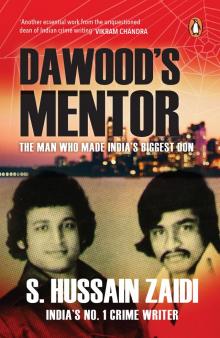 Dawood's Mentor
Dawood's Mentor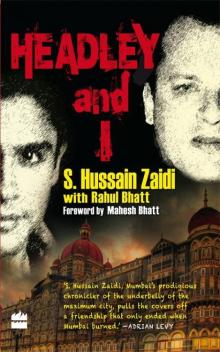 HEADLEY AND I
HEADLEY AND I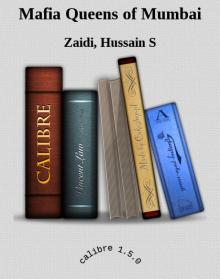 Mafia Queens of Mumbai
Mafia Queens of Mumbai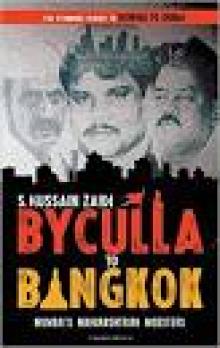 Byculla to Bangkok
Byculla to Bangkok Black Friday
Black Friday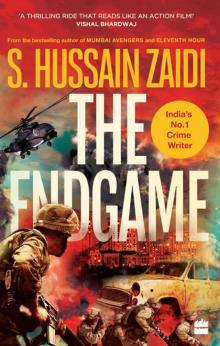 The Endgame
The Endgame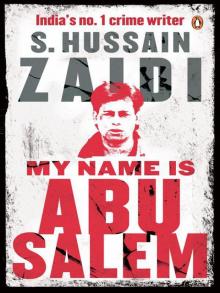 My Name is Abu Salem
My Name is Abu Salem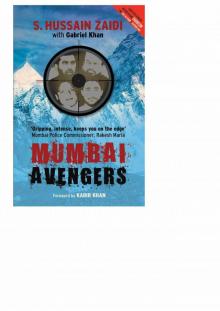 Mumbai Avengers
Mumbai Avengers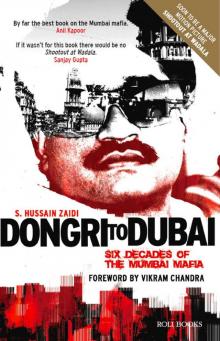 Dongri to Dubai - Six Decades of the Mumbai Mafia
Dongri to Dubai - Six Decades of the Mumbai Mafia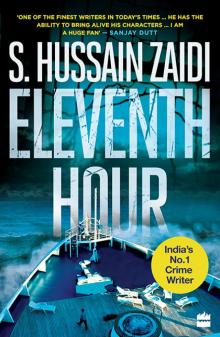 Eleventh Hour
Eleventh Hour